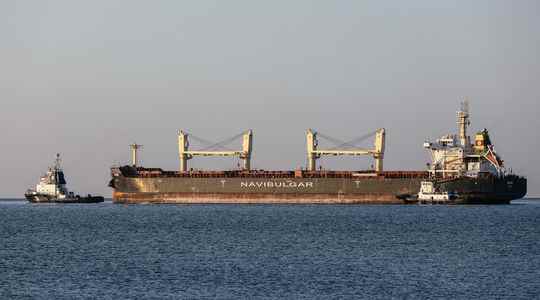“In view of the terrorist act carried out by the kyiv regime with the participation of British experts against ships of the Black Sea Fleet and civilian ships involved in the security of grain corridors, Russia is suspending its participation in the implementation of the agreement on export of agricultural products from Ukrainian ports”. The announcement was communicated by the Russian Minister of Defense on his Telegram account, Saturday, October 29 at the end of the afternoon.
This is a meaningful decision since at the end of July, Ukraine and Russia, under the aegis of the United Nations and Turkey, had agreed on the bases of a text ensuring the continuation of Ukrainian cereal exports. , vital for the food supply of many countries. The commitment had made it possible to export more than 9 million tonnes of cereals and agricultural products, blocked until then, loosening the vice on the food market.
- A withdrawal justified by alleged “terrorist acts” in the bay of Sevastopol
The decision was taken in reaction to drone attacks on the waters of Sevastopol Bay that the Kremlin blames on its Ukrainian rival. “Nine unmanned aerial vehicles and seven autonomous maritime drones” have targeted ships that are involved in the security of convoys responsible for exporting Ukrainian grain, claims Moscow. The country led by Vladimir Putin points to the involvement of the United Kingdom in the preparation of these “most massive” attacks in the history of the conflict. He even speaks of terrorist acts. Moscow assures at the same time that Ukraine and the United Kingdom were behind the strikes that caused leaks on the Nord Stream 1 and 2 gas pipelines at the end of September. The British Defense reacted to the accusations by denouncing “false information” intended to “divert attention”.
- kyiv denounces a “false pretext”
kyiv, for its part, points to a “false pretext” highlighting the immobilization of several boats in the Joint Coordination Center (JCC) responsible for supervising this agreement, for several days.” Russia has started to worsen the world shortage of food in September, when it began to block the movements of ships transporting our agricultural production,” insisted Volodymyr Zelensky in his daily address to the Ukrainian people on Saturday.
“Russia is once again trying to use the war it started as a pretext to weaponize food,” White House National Security Council spokeswoman Adrienne said. Watson. Through the voice of its head of diplomacy Josep Borrell, the European Union “urges Russia to reconsider its decision”. The United Nations, a party to this agreement, also called on Russia to maintain its commitment. “We stress the urgency of (extending the agreement) in order to contribute to global food security, and to lessen the suffering that the cost of living crisis is inflicting on billions of people,” said the doorman. – organization spokesperson, Stéphane Dujarric.
- Even ‘worse’ power cuts to be expected, kyiv says
On Ukrainian territory, Russian strikes on electrical installations continue. The networks are heavily damaged and the Ukrainian authorities announced on Friday that at least four million people, particularly in the kyiv region, are without electricity. An “unprecedented” figure, we are assured in kyiv. “In many cities and districts of our country, cuts have been introduced to stabilize” the situation of fuel poverty, insisted on explaining the head of state, Volodymyr Zelensky. “Unfortunately, more severe and longer cuts will be put in place in the coming days,” warned the Ukrainian operator DTEK.
- EU froze 17 billion assets of Russian oligarchs
The European sanctions take a more concrete turn in the eyes of the general public with the declarations, Saturday, of the European Commissioner for Justice Didier Reynders. “So far, the assets of 90 people have been frozen, representing more than 17 billion euros in seven member states, including 2.2 billion in Germany,” he said in an interview with the German group’s media. Funke, whose daily Westdeutsche Allgemeine Zeitung. This gives an idea of the pressure exerted by Europe on the regime of Vladimir Putin. Austria, Belgium, Germany, France, Luxembourg, Ireland and Italy are among the countries most involved in the sanction system.
Western sanctions have also led to “the freezing of 300 billion euros” of foreign exchange reserves of the Russian Central Bank in the world. Didier Reynders said he was in favor of using this money for the reconstruction of Ukraine. In total, and since the invasion of Crimea in 2014, 1,236 Russians have been subject to asset freezes and bans from entering the EU.
